Pro-Beijing camp lawmakers have welcomed a High Court ruling which will disqualify two localist Youngspiration politicians from being lawmakers.
The government won its bid to eject Yau Wai-ching and Baggio Leung Chung-hang from the legislature on Tuesday. The pro-independence legislators used words during their swearing-in session that some deemed an insult to Chinese people, sparking the recent oath-taking controversy.
Starry Lee Wai-king, chairwoman of the pro-Beijing Democratic Alliance for the Betterment and Progress of Hong Kong, said the judgement was in accordance with law, and Beijing’s recent Basic Law interpretation, which stated that lawmakers must sincerely, solemnly, accurately and completely read the oath of office.
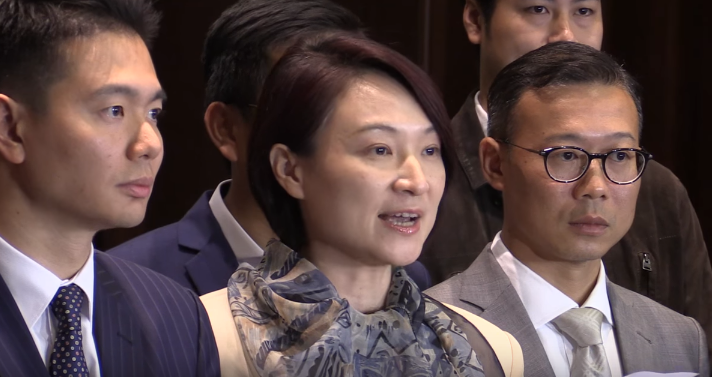
“The ruling of the High Court represents justice,” she said. “We hope the ruling of the court can calm the waves of the oath controversy down, so that the legislature and society can go back to normal.”
The court ruled that Leung and Yau had vacated their office since 12 October, when they first attempted to take the oath.
Lee asked the Legislative Council’s secretariat to retrieve their wages and expense as soon as possible.
Horace Cheung Kwok-kwan, the party’s lawmaker and a lawyer, cited the judgment as saying that the duo’s seats would be declared vacant, with or without referring to the terms of the interpretation. He also said that the their lawyers did not argue that they took the oaths in accordance with the Oaths and Declarations Ordinance.
‘Great happiness’
Elizabeth Quat, another lawmaker of the party, said the ruling was “to the great happiness of people” and she has received many messages from people welcoming the judgment.
She said many people told her that they hoped that the case can act as a reference for future cases challenging the oaths of other lawmakers.
“I hope from now on those who insult China and advocate Hong Kong independence do not enter the LegCo again,” she said.

Federation of Trade Unions lawmaker Kwok Wai-keung said that the government should take follow-up action concerning an application for judicial review concerning lawmaker Lau Siu-lai. The court has been requested to also rule her oath invalid.
Luk Chun-hung, another lawmaker of the party, said the duo “deserve” the ruling. He also urged the pan-democrats to support the ruling and stop help “harbouring the duo.”
Interpretation unnecessary
The pro-democracy Civic Party said they respected the court judgment.
Dennis Kwok Wing-hang, the legal sector lawmaker, also cited the judgment as saying that its rationale was unaffected by the Basic Law interpretation by Beijing.
“This proves that the decision to interpret the Basic Law was very wrong and unnecessary, there are no legal considerations but political considerations,” he said.
The ruling also touched on the point that it has the right to intervene in LegCo matters over the validity of the oath: “the non-intervention principle as applied in Hong Kong does not prohibit the court from determining the matters under challenge in these proceedings.”
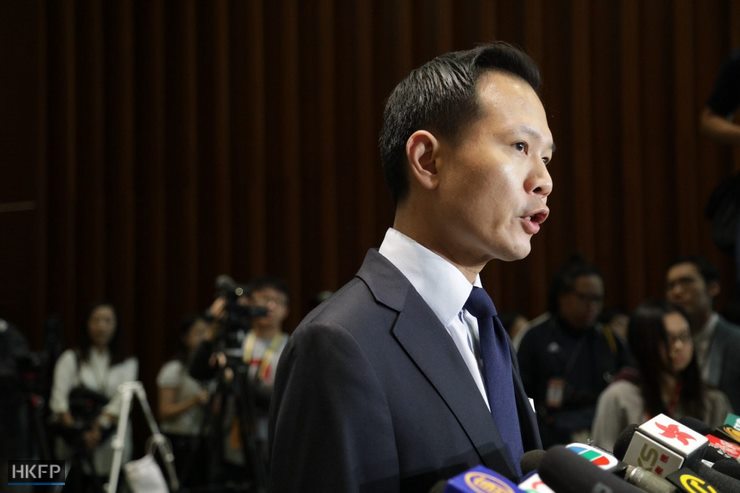
Kwok said the court followed past cases on the matter of the non-intervention principle, but it was not entirely clear when the court should intervene. It was necessary for the Court of Appeal or the Court of Final Appeal to further clarify the court’s position, he said.
Lawmaker Alvin Yeung Ngor-kiu said the party would support pro-democracy candidates who had the best chance of winning seats in by-elections triggered by the judgment.
See also: ‘This is not the end’: Politician Baggio Leung expresses intention to appeal LegCo disqualification
Tanya Chan Suk-chong, another Civic Party lawmaker, said the issue of the duo’s paid wages and expenses should be discussed by the LegCo Commission, a body formed by lawmakers which discusses administrative measures for the LegCo.


Timeline: What has happened so far.
Oct 11: The government says that lawmakers who decline or neglect to take their oath will be disqualified in accordance with Section 21 of the Oaths and Declarations Ordinance.
Oct 12: Youngspiration’s Yau Wai-ching and Baggio Leung Chung-hang take their oaths at the Legislative Council, referring to China as “Chee-na,” which some consider offensive. The Legislative Council Secretariat rejects the duo’s oaths.
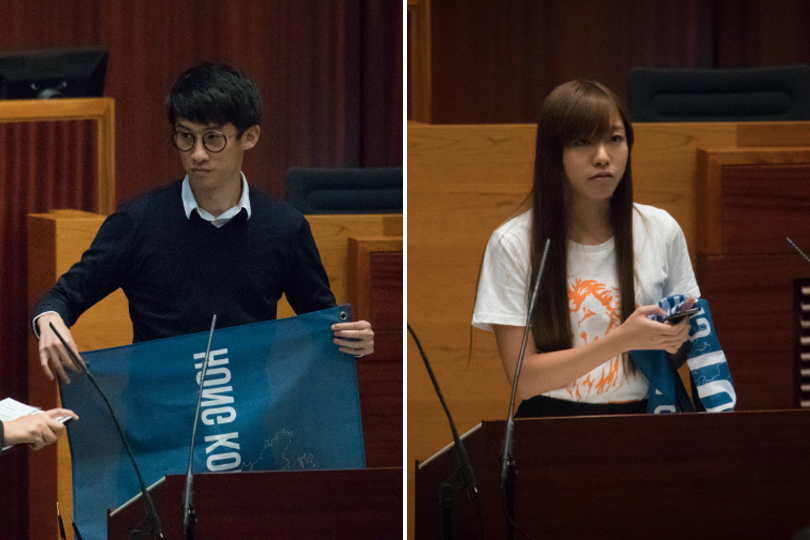
Oct 18: Legislative Council President Andrew Leung invites lawmakers whose oaths were rejected to make a written request to re-take their pledges.
Oct 18: The Youngspiration lawmakers request to re-take their oaths.
Oct 18: Chief Executive Leung Chun-ying and the Department of Justice file an emergency judicial review against Andrew Leung’s decision to allow them to re-take the oath. They also request an interim injunction to bar Leung from administering the oath. The court grants leave for the judicial review but refuses to issue an interim injunction.
Oct 18: Andrew Leung objects to the government’s interference in the oath row.

Oct 19: Pro-Beijing lawmakers stage a walkout to prevent Yau and Leung from being sworn-in.
Oct 25: Andrew Leung decides to defer the re-taking of oaths by the Youngspiration lawmakers until the government’s judicial review challenge is concluded.
Oct 26: The pro-democracy camp demands Andrew Leung step down after he backtracked on his position on the oath controversy.
Nov 3: The High Court begins hearing the judicial review challenge.

Nov 3: Beijing notifies the Hong Kong government that it will discuss handing down an interpretation of Article 104 of the Basic Law at the Standing Committee of the National People’s Congress (NPCSC) meeting.
Nov 7: Beijing’s interpretation is handed down. This is the fifth interpretation issued by the NPCSC since the 1997 handover.
Nov 7: The High Court invites the parties to the judicial review challenge to submit supplementary materials in light of the issuance of an NPCSC interpretation.
Nov 8: Hong Kong’s lawyers to hold a silent march in protest of Beijing’s decision. This is the fourth silent march organised by the legal sector since the 1997 handover.
Nov 15: The government wins its judicial review at the High Court. Yau Wai-ching and Baggio Leung Chung-hang are barred from the legislature.
Which provision in the Basic Law was concerned in the latest interpretation?
Beijing’s interpretation concerned Article 104 of the Basic Law, which stipulates: “When assuming office, the Chief Executive, principal officials, members of the Executive Council and of the Legislative Council, judges of the courts at all levels and other members of the judiciary in the Hong Kong Special Administrative Region must, in accordance with law, swear to uphold the Basic Law of the Hong Kong Special Administrative Region of the People’s Republic of China and swear allegiance to the Hong Kong Special Administrative Region of the People’s Republic of China.”
The interpretation sought to define the term “in accordance with law,” which now means that oath-takers must “fulfil the statutory requirements in format and content” by “accurately, completely and solemnly” reading out phrases such as the full name of Hong Kong.
It stated that the “oath administrator” has the duty to confirm that the oath-taking complies with Hong Kong law and the interpretation. Critics say that the interpretation
It also warns that those who make a “false oath” or break their oath – which it says is legally binding – are not allowed to retake their pledges and will bear “legal responsibility.”
The full text of the interpretation is available here.
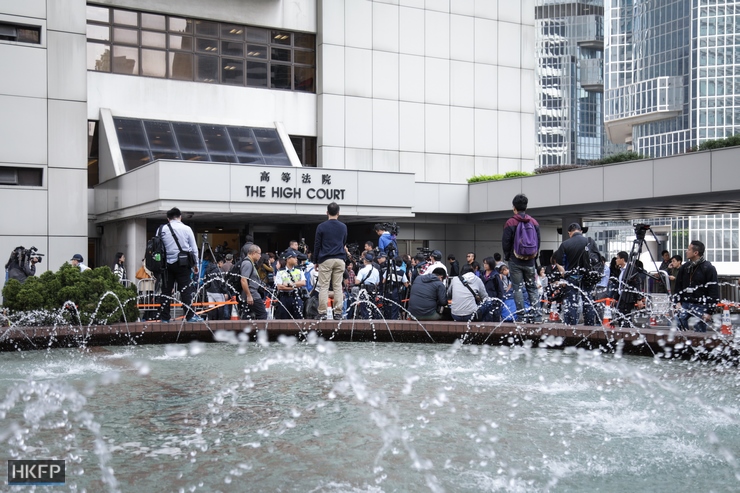
What does Beijing say about the interpretation?
The Chinese government said the interpretation of Hong Kong’s mini-constitution helps “protect the rule of law and improve the legal system” of the autonomous territory.
The China Liaison Office – Beijing’s organ in Hong Kong – said that the interpretation serves to fulfil Beijing’s constitutional duty, and that it is “very important, very necessary and very timely” on the basis that Hong Kong’s existing laws regarding oath-taking are incomplete.
Basic Law Committee Chair Li Fei said self-determination is “essentially” the same as Hong Kong independence and therefore contravenes the territory’s mini-constitution. Li’s remarks suggest that lawmakers who advocate self-determination, such as Nathan Law of the Demosistō party and independent lawmaker Lau Siu-lai, may be at risk of losing office despite having been sworn-in.
However, lawyers said that it remains unclear how the interpretation will be applied in Hong Kong’s common law system.
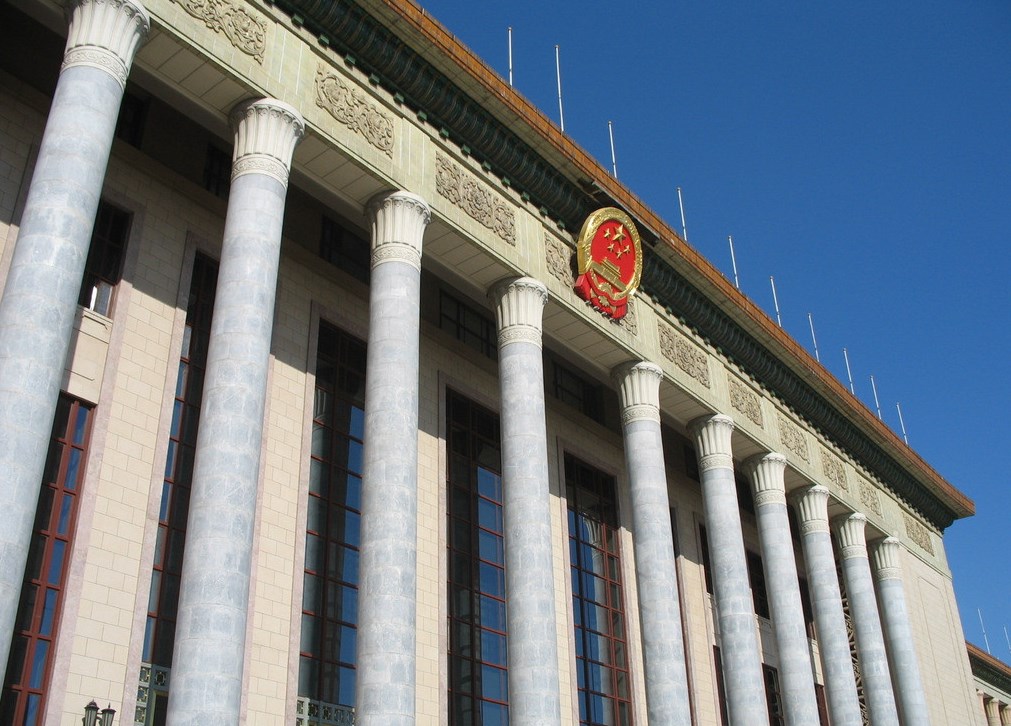
What do critics say about the interpretation?
Hong Kong’s legal professionals have criticised Beijing for bypassing the amendment procedure set out in the territory’s mini-constitution and making a “direct application” of Chinese national laws to Hong Kong.
HKU law professor Benny Tai said the NPCSC is “actually legislating directly for Hong Kong” by adding detailed provisions to local laws on oath-taking in the name of an interpretation.
Article 159 of the Basic Law sets out the procedure for amending the mini-constitution, but the procedure is an onerous one. It has never been invoked since the 1997 handover.
Under Article 18 of the Basic Law, national laws are not applicable to Hong Kong, except for laws concerning defence, foreign affairs and matters outside the autonomy of Hong Kong, and only by amending Annex III of the Basic Law and then by way of promulgation or legislation.
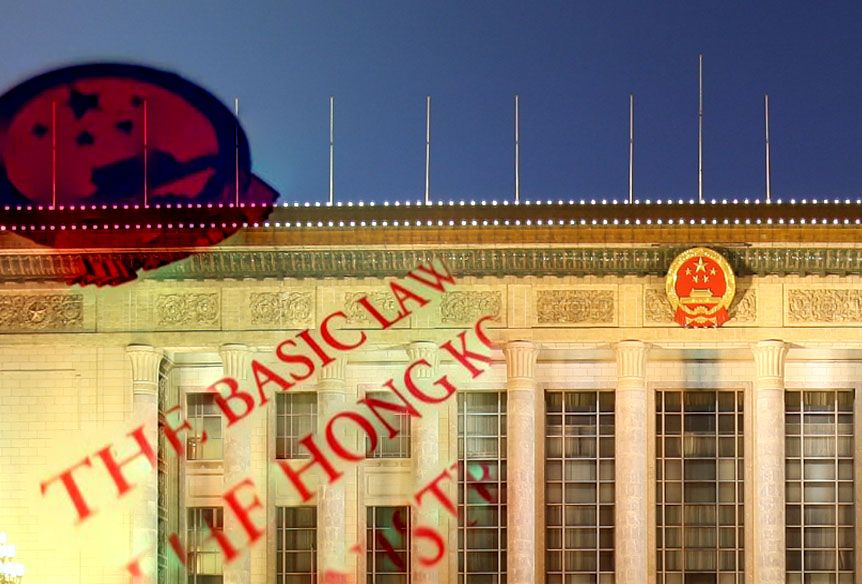
If the interpretation has an retroactive effect, it will also not be an interpretation but rather an adjudication of an issue that is being heard by Hong Kong’s court, Tai said.
If this is the case, the interpretation would violate Articles 19 and 80 of the Basic Law, which grant Hong Kong independent judicial power and entitle the courts to exercise the judicial power of the territory respectively.
HKU law professor Johannes Chan and legal sector lawmaker Dennis Kwok argued that Article 104 is clearly written and has little room for interpretation.
Lawyer Kevin Yam said the NPCSC interpretation, handed down while a lawsuit is pending, set a “terrible precedent” and “created more uncertainty.” For example, it is unclear from the vague wording of the interpretation what “legal responsibility” oath-takers will face for falsifying or breaching their oath. Yam said any legal consequences will be a matter of Hong Kong laws, which Beijing has no power to influence.
For more detailed discussions, see:
‘Terrible precedent’: Lawyers say Beijing has effectively amended, not interpreted, the Basic Law
The legal limits on Beijing’s powers to interpret Hong Kong’s Basic Law
What is an interpretation of the Basic Law?
Article 158(1) of the Basic Law confers the power of interpreting Hong Kong’s mini-constitution on China’s top legislative body, the Standing Committee of the National People’s Congress (NPCSC). In other words, the NPCSC’s opinions are final and binding.
An NPCSC interpretation – which has happened on four occasions since the 1997 handover – is always controversial owing to the public perception that Beijing is undermining Hong Kong’s judicial independence.

What is the scope of Beijing’s interpretive power and when can they intervene?
Hong Kong’s judiciary has debated the scope of the NPCSC’s interpretive power. In Ng Ka Ling v. Director of Immigration in 1999, the Court of Final Appeal – Hong Kong’s final appellate court – took a strong stance in defending judicial autonomy.
But the Court issued a clarification at the government’s request a month later, saying that it “accepts that it cannot question [the] authority” of the NPCSC. It did, however, subtly add that the authority pertains to acts that are in accordance with the Basic Law and the procedure stated in the mini-constitution.
Almost a year later, in Lau Kong Yung v. Director of Immigration, the Court of Final Appeal acknowledged that the NPCSC’s power under Article 158(1) is “in general and unqualified terms,” meaning that it can interpret the Basic Law at anytime.
The Court also quoted legal scholar Yash Ghai, who wrote that Beijing’s interpretive power is “plenary in that it covers all the provisions of the Basic Law” and that it “may be exercised in the absence of litigation.” The Court did not reject this analysis.
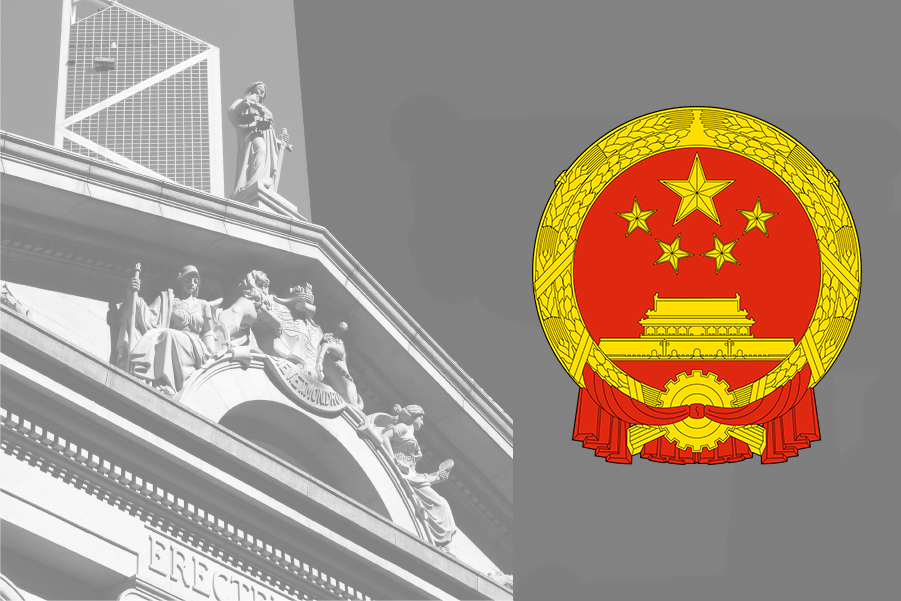
Is there any other precedent for Beijing interpreting the Basic Law?
There have been four NPCSC interpretations since the 1997 handover.
The first interpretation took place in 1999, in the case of Ng Ka Ling v. Director of Immigration. The Hong Kong government asked Beijing to interpret Article 24 of the Basic Law after the Court of Final Appeal handed down a ruling entitling all Chinese citizens with Hong Kong parents to the right of abode.
The government made the request again in 2005, regarding the term of office of chief executives when replacing predecessors who vacate office before their terms expire.
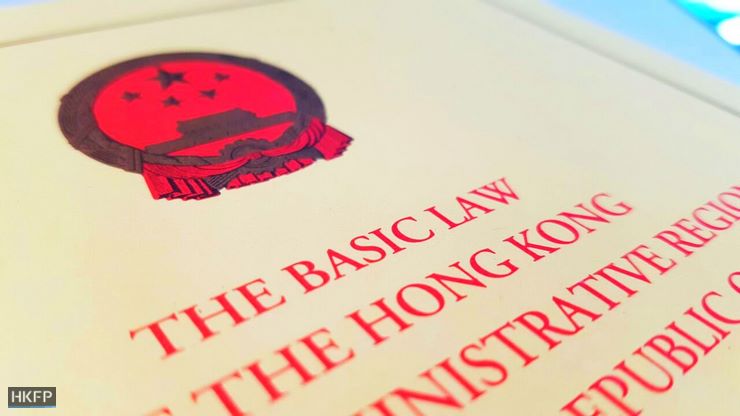
The NPCSC has interpreted the Basic Law on its own initiative once. The interpretation, issued in 2004, concerned the election procedure for choosing the chief executive.
In 2011, the Court of Final Appeal referred the case of Democratic Republic of the Congo v. FG Hemisphere to the NPCSC over the issue of state immunity.
All of the interpretations sparked controversy in Hong Kong society. The legal profession in the territory held two silent marches in protest of the 1999 and 2005 interpretations.
